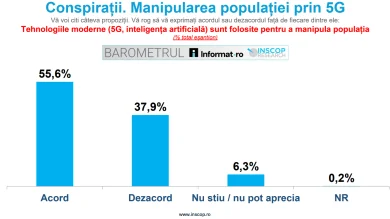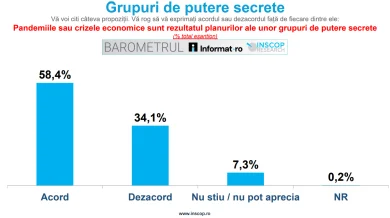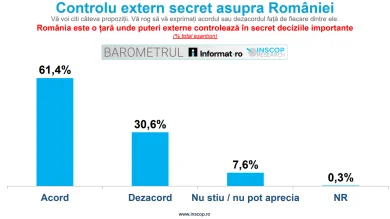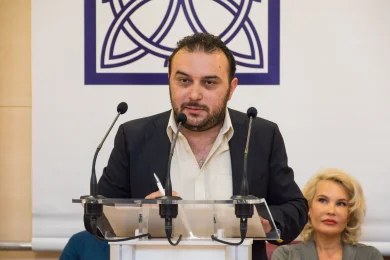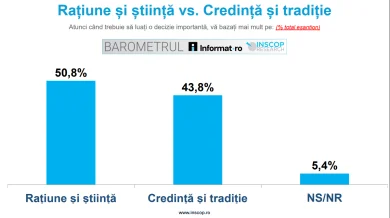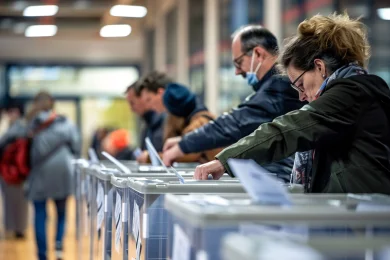27 February 08:41

Exclusive
Foto INSCOP Research
Although we complain all over the Western world that the elections of the last few years have been the captives of the fake-news phenomenon, the Romanian electorate is keen to teach us a lesson (here too): about 76% of Romanians say that our voting preferences are affected to a fairly or even very great extent by disinformation and fake news (a percentage that is slightly up compared to three or so years ago). In all seriousness, we are either rational or we are not.
This level of awareness is both encouraging and interesting. But in the post-truth era, one man's fake-news is unfortunately another man's truth. Who knows, after all, what one or the other defines as disinformation and fake-news...
Those who believe to the highest degree (to a very high degree) that misinformation influences our political elections are the gray and white collars, those in Bucharest and the big urban areas, private employees, those in the 30-44 age bracket. Education level has an influence, but it does not differentiate as much as we would expect the public on this issue.
The broader conclusion may be somewhat paradoxical: the belief that misinformation exists influences us is not simply the opposite of belief in conspiracy theories. As both access to information and access to being a disseminator of information have become more relaxed, vulnerability to misinformation no longer has easily predictable socio-demographic characteristics at the other end either.
Methodology: The survey carried out by INSCOP Reasearch commissioned by Funky Citizens was collected from 16 to 23 December 2024 using the CATI method (telephone interviews), the stratified multistage sample volume was 1000 people, representative of significant socio-demographic categories (gender, age, occupation) for the non-institutionalized population of Romania, aged 18 years and over. The maximum permissible error of the data is ± 3.1%, at a 95% confidence level. Comparative data for June, September 2021 and January 2022 respectively were extracted from the study "Public distrust: West vs. East, the rise of the nationalist current in the era of misinformation and fake news phenomenon" conducted by INSCOP Research commissioned by the think-tank STRATEGIC Thinking Group in the framework of a research project supported by The German Marshal Fund of the United States - and funded by the Black Sea Trust for Regional Cooperation through the True Story Project.
This level of awareness is both encouraging and interesting. But in the post-truth era, one man's fake-news is unfortunately another man's truth. Who knows, after all, what one or the other defines as disinformation and fake-news...
Those who believe to the highest degree (to a very high degree) that misinformation influences our political elections are the gray and white collars, those in Bucharest and the big urban areas, private employees, those in the 30-44 age bracket. Education level has an influence, but it does not differentiate as much as we would expect the public on this issue.
The broader conclusion may be somewhat paradoxical: the belief that misinformation exists influences us is not simply the opposite of belief in conspiracy theories. As both access to information and access to being a disseminator of information have become more relaxed, vulnerability to misinformation no longer has easily predictable socio-demographic characteristics at the other end either.
Methodology: The survey carried out by INSCOP Reasearch commissioned by Funky Citizens was collected from 16 to 23 December 2024 using the CATI method (telephone interviews), the stratified multistage sample volume was 1000 people, representative of significant socio-demographic categories (gender, age, occupation) for the non-institutionalized population of Romania, aged 18 years and over. The maximum permissible error of the data is ± 3.1%, at a 95% confidence level. Comparative data for June, September 2021 and January 2022 respectively were extracted from the study "Public distrust: West vs. East, the rise of the nationalist current in the era of misinformation and fake news phenomenon" conducted by INSCOP Research commissioned by the think-tank STRATEGIC Thinking Group in the framework of a research project supported by The German Marshal Fund of the United States - and funded by the Black Sea Trust for Regional Cooperation through the True Story Project.
